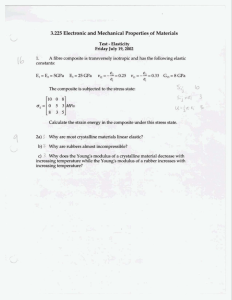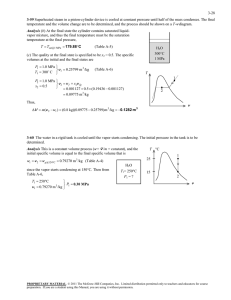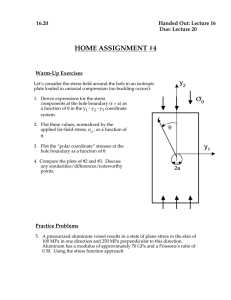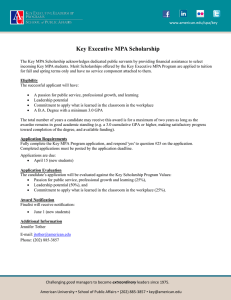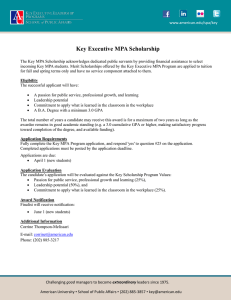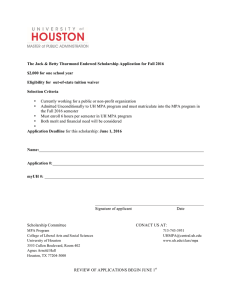Public Administration (M.P.A.)
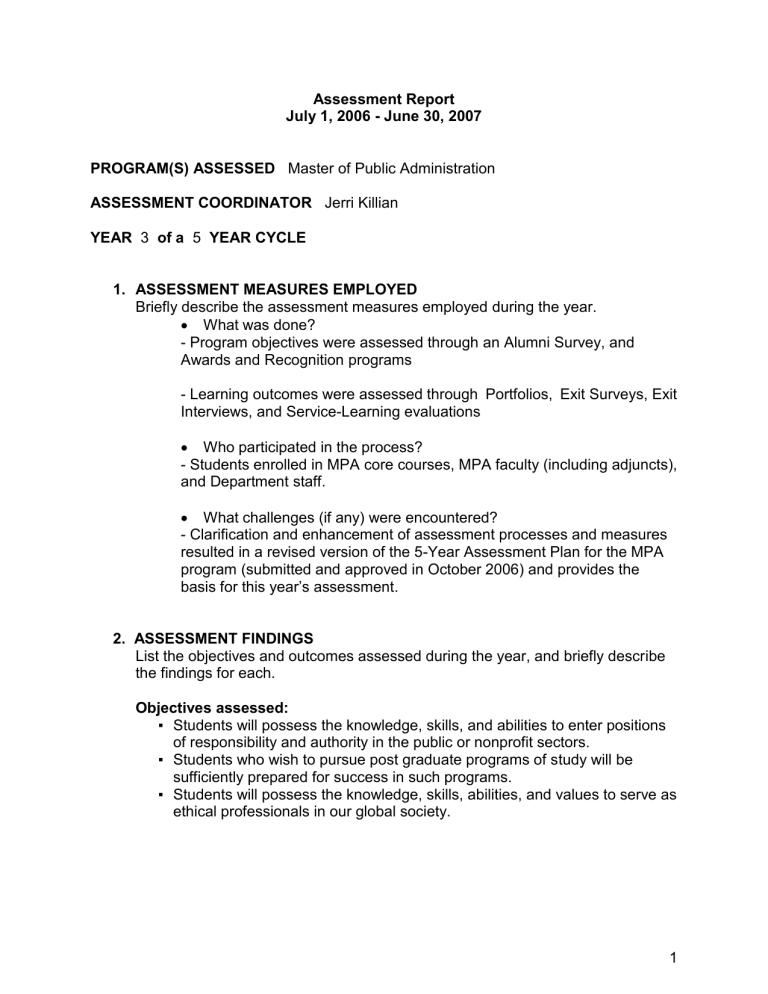
Assessment Report
July 1, 2006 - June 30, 2007
PROGRAM(S) ASSESSED Master of Public Administration
ASSESSMENT COORDINATOR Jerri Killian
YEAR 3 of a 5 YEAR CYCLE
1. ASSESSMENT MEASURES EMPLOYED
Briefly describe the assessment measures employed during the year.
What was done?
- Program objectives were assessed through an Alumni Survey, and
Awards and Recognition programs
- Learning outcomes were assessed through Portfolios, Exit Surveys, Exit
Interviews, and Service-Learning evaluations
Who participated in the process?
- Students enrolled in MPA core courses, MPA faculty (including adjuncts), and Department staff.
What challenges (if any) were encountered?
- Clarification and enhancement of assessment processes and measures resulted in a revised version of the 5-Year Assessment Plan for the MPA program (submitted and approved in October 2006) and provides the basis for this year’s assessment.
2. ASSESSMENT FINDINGS
List the objectives and outcomes assessed during the year, and briefly describe the findings for each.
Objectives assessed:
▪
Students will possess the knowledge, skills, and abilities to enter positions of responsibility and authority in the public or nonprofit sectors.
▪ Students who wish to pursue post graduate programs of study will be sufficiently prepared for success in such programs.
▪ Students will possess the knowledge, skills, abilities, and values to serve as ethical professionals in our global society.
1
Objectives measures and findings:
▪ Alumni Survey: Survey of alumni in the second and fifth years after graduation. MPA alumni who graduated in 2002 and 2005, respectively, were surveyed this year.
Findings: Significant and relevant alumni findings include:
- 100% of respondents indicated they were satisfied or very satisfied with the MPA program and the quality of instruction received
- 93% of respondents indicated they agree or strongly agree that the MPA program prepared them for success in their profession
- 93% of respondents indicated they were satisfied or very satisfied with their advisor and the services/guidance their advisor provided
- 93% of respondents are currently employed in public or nonprofit administration
- 50% of respondents indicated they did not receive adequate financial assistance while pursuing the MPA degree
- 50% of respondents indicated they would be interested in pursuing a
Ph.D. program at WSU in public administration, public administration and policy, or public affairs and policy
- 100% of respondents indicated that collaboration among multiple WSU academic disciplines, colleges, and/or programs would strengthen the
Ph.D. program in public administration, public administration and policy, or public affairs and policy
▪
Local, State and National Awards and Recognition:
Findings:
- An MPA student, Virginia Gimenez, was recognized as the
Outstanding MPA student by the UAG department and CoLA in 2006-07.
- An MPA student, Sonia Ninon, was recognized as the Outstanding MPA student by the UAG department and SoGS in 2006-07.
- The MPA program was again recognized by the National Association of
Schools of Public Affairs and Administration (NASPAA) as continuing to meet NASPAA’s accreditation requirements during AY 2006-07 and thus considers the program to be in good standing relative to its national accreditation.
Outcome assessed:
Students will possess the advanced knowledge required to evaluate solutions for policy and program problems occurring at various levels of government or in the nonprofit sector.
Outcome measures and findings:
2
▪ Portfolios: Consists of a sampling of materials (papers/examinations) from core MPA courses to demonstrate improvement over time for the stated learning outcomes. Upon completion of 4 core MPA courses, a mandatory meeting with the student’s advisor shall be scheduled to review and discuss student progress. If warranted to promote satisfactory progress, an additional mandatory meeting shall be scheduled upon completion of 7 core MPA courses to review and discuss student performance at that time. Students may access their portfolio at any time and will receive their completed portfolio at the time of the exit interview
Findings: AY 2006-07 was the first year the newly designed, systemic process was utilized in the assessment of student portfolios. This process proved useful for students and faculty alike.
▪
Faculty advisors complied with the new Portfolio process described above and met with 100% of MPA students who had completed 4 core MPA courses. Discussions included constructive feedback and helpful recommendations to enhance future student performance, to congratulate those students who had performed well in all 4 core courses, and to address any questions students may have. Discussions were documented in student files.
▪ Again in compliance with the new Portfolio process, the appropriate faculty advisor met with one MPA student who had completed 7 core MPA courses and was attempting to make satisfactory progress. Plans were developed to assist this student with successfully completing the MPA program of study and earn the MPA degree.
▪ As planned, students were granted access to their Portfolios at any time and students scheduled to graduate in AY 2006-2007 were given their
Portfolios at the time of their Exit Interview.
▪ Exit Survey : A quantitative survey shall be administered to students enrolled in the core MPA courses (URS 700, 701, 702, 703, 704, 705,
706, 707, and 708) at the end of each quarter to assess perceptions of the extent to which each of these courses and the MPA program to date, respectively, facilitates achievement of stated learning outcomes; a mean score of 2.0 or less (1 is best) on a 4-point scale shall be realized for each course.
Findings: A mean rating score of 1.53 was realized on MPA Exit Surveys, with a score of 1.59 pertaining to course-related learning outcomes and
1.47 for questions pertaining to the outcomes of the MPA program as a whole. These findings exceed the minimum acceptable standard set forth for this measure.
3
▪ Exit Interview : when degree check is completed each quarter, a member of the CUPA staff will conduct a qualitative interview with each MPA candidate scheduled for graduation to assess student perceptions of achieving stated program learning outcomes and objectives, and to identify potential areas for program improvement; at least 75% of comments shall be favorable.
Findings: The overall results of the Exit Interviews were very favorable with 85.5% of participants indicating that no improvements or only minor improvements are needed in the MPA program. This exceeds the goal of
75% favorable responses! Suggestions for improvement tended to focus on various aspects of elective course offerings and various aspects of the two courses leading to the MPA Capstone Project, as well as the
Capstone course itself. Highlights from the Exit Interview include:
- 87.5% reported the quality of instruction from full time faculty as
“good/competent,” “very good,” or “excellent.”
- 78.5% reported no improvements or only minor improvements needed in terms of how well the MPA curriculum prepared students for their professional goals.
- 77.0% reported no improvements or only minor improvements needed in terms of the balance between the emphasis placed on theory and practice in the MPA program.
- 73.3% reported no improvements or only minor improvements needed in terms of the MPA program providing student opportunities to interact or network with practitioners in their chosen fields.
- 50.0% reported no improvements or only minor improvements needed in the timing/availability of Department elective course offerings; the remaining 50% reported a few minor and a few major improvements needed in this area.
- Finally, 53.8% reported they would be interested in pursuing a
Ph.D. offered by WSU in Public Administration, Public Health,
Nonprofit Administration, or Public Policy!
▪ Service-Learning Evaluation: At least 75% of students will indicate that service learning increased their depth of understanding of, enhanced their ability to apply qualitative and quantitative methods to, and improved their ability to evaluate solutions for problems related to public administration.
4
Findings: 100% of students engaged in service learning through the MPA
Capstone course, URS 708, indicated that their understanding of, ability to apply qualitative and quantitative methods to, and ability to evaluate solutions for problems related to public administration were significantly enhanced as a result of their service-learning experience. This finding exceeds the goal by 25%!
3. PROGRAM IMPROVEMENTS
List planned or actual changes (if any) to curriculum, teaching methods, facilities, or services that are in response to the assessment findings.
▪ An analysis of elective course offerings is currently underway to address
MPA students concerns noted in Exit Interviews. Results of this analysis and actions taken will be reported in the AY 2007-08 assessment report.
▪ Analyses and discussions to address student concerns noted in the Exit
Interviews pertaining to the two courses leading to the MPA Capstone
Project and the Capstone course have begun and are continuing. It is planned that consensus will be reached to develop strategies for improvement in AY 2007-08, with implementation in 2008-09.
▪ As planned, a new course, Statistics for Public Managers (URS 701), was added to the MPA course offerings in AY 2006-07 and the very favorable findings of learning outcomes for this course are included in this assessment report.
▪ As planned, the sequence of core MPA course offerings were revised in AY
2006-07 to provide an improved balance between theoretically-oriented and application-oriented curriculum offered each quarter. Findings of learning outcomes in this assessment report reflect the new course sequence.
▪ As planned, a new numbering scheme was devised to reflect the new sequence of core MPA course offerings and went into effect in AY 2006-07.
MPA core courses are now numbered as URS 700, 701, 702, 703, 704,
705, 706, 707, and 708.
▪ The Exit Survey and the Alumni Survey were revised to include questions that specifically address diversity and ethics, respectively, to enhance the assessment of learning outcomes and program objectives. The newly developed Exit Interview also includes questions on these topics. Findings reported herein include responses to these questions.
▪ A member of the MPA faculty, Dr. Jennifer Subban was promoted to
Associate Professor and granted tenure in AY 2006-07. Congratulations!
5
▪ A new member of the Department faculty, Myron Levine, joined the MPA faculty in Fall 2006. His expertise in all things urban enhanced the learning experience for MPA students in AY 2006-07. Congratulations!
▪ A successful faculty search was performed in AY 2006-07 and resulted in the hiring of Dr. Enamul Choudhury, who will bring significant expertise in public administration to further enhance the MPA program beginning Fall
2007.
4. ASSESSMENT PLAN COMPLIANCE
Explain deviations from the plan (if any).
▪ No deviations from plan this year!
5. NEW ASSESSMENT DEVELOPMENTS
Describe developments (if any) regarding assessment measures, communication, faculty or staff involvement, benchmarking, or other assessment variables.
▪ As planned, Exit Interviews were performed individually with graduating
MPA students by the Center for Urban and Public Affairs staff to prevent intimidation of graduating MPA students participating in the process and to preserve integrity of the findings.
▪ As planned, the MPA program implemented plans to better inform adjunct faculty about the assessment process, program objectives, course and program learning outcomes, and their respective significance to our collective success. Efforts to better inform and integrate adjunct MPA faculty are on-going.
▪ As planned, the MPA program implemented plans to better inform the MPA
Advisory Board about the assessment process, program objectives, course and program learning outcomes, and their respective significance to our collective success. Efforts to better inform the MPA Advisory Board are ongoing.
6
